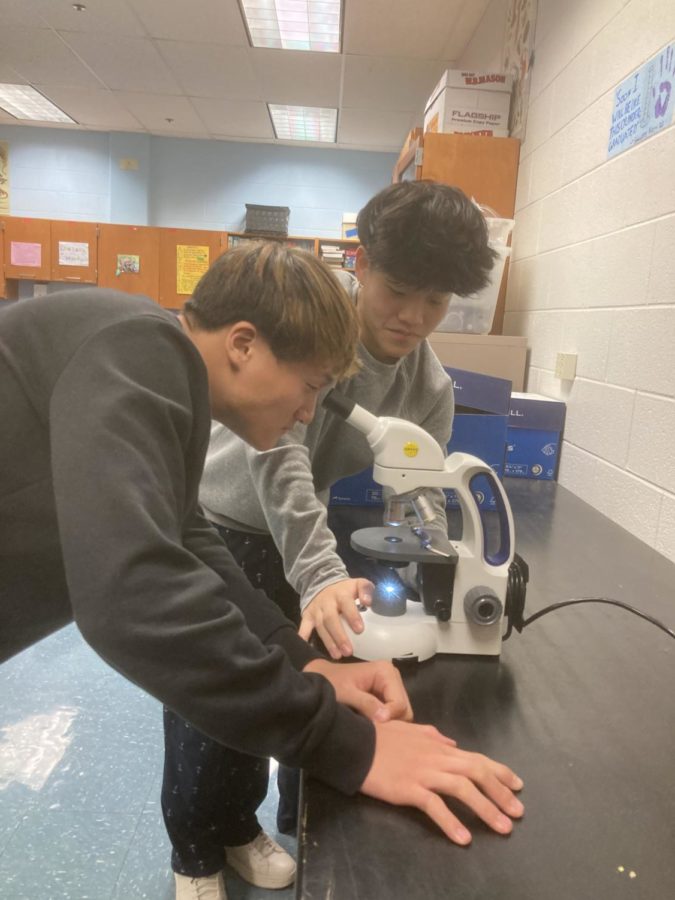Twin, triplets telepathize despite unique identities
Twins and seniors Andrew and Josh Jung look into a microscope during AP Biology on Nov. 29.
January 18, 2023
While some siblings verbally share their thoughts and feelings with one another, seniors Andrew Jung and Sophia Creeks and freshman Mohammed Abumelha do the same without needing words.
Twin telepathy, twins’ ability to access each other’s instincts and emotions, is a phenomenon that continuously fails to be supported by quantitative research. Despite lack of scientific proof, twins can still experience unexpected moments of deep mental and emotional connection, even as they develop into different individuals by their teenage years.
According to Discover Magazine, although twins might appear to have similar personalities as children, they grow increasingly dissimilar over time until they have unique personalities and passions. However, students have proved that common interests and character qualities are not required to exhibit twin telepathy.
“My brother Josh and I used to swim together, golf together and play basketball together,” Jung said. “When we were fifteen, he chose a different route to try to go to school as a regular student, and I chose to chase my dream of being a collegiate athlete.”
Despite their distinct interests, twins and triplets can still have shared thoughts, feelings and experiences. According to Jung, he and his twin brother have even experienced telepathy on a physical level.
“I do remember he was in Lebanon for a trip and I was home, and I think he had the stomach flu,” Jung said. “But then, the same week, something was wrong that made my stomach hurt so much.”
Twins and triplets further prove twin telepathy by attesting to thoughts occurring to each of them simultaneously.
“There was one time I was in my room and I heard my parents arguing with one of my siblings downstairs,” Creeks said. “I was about to jump in and say something to defend them and they said the exact same thing that I was going to defend them with.”
For some twins, strong emotional connections leading to telepathy are not always beneficial. According to Jung, constantly shared experiences can be troubling when in need of advice from more knowledgeable sources.
“We’re going through our college stuff right now and we don’t really have a sibling that would be able to help us,” Jung said. “Sometimes I wish I had an older brother or sister who could help me.”
Although telepathy occurs among twins and triplets, it does not always equate to shared or even similar personalities. Per the National Library of Medicine, personality differences in twins are often a result of non-shared environmental influences. However, for some twins and triplets, dissimilarities in character develop naturally rather than through different activities and interests. Despite sharing some social tendencies as children, Creeks and her brothers began to lead different social lives shortly after high school.
“I used to be the most extroverted one in elementary school and middle school, and my two brothers were nerds and super introverted and didn’t talk to anyone,” Creeks said. “Then sophomore and junior year of high school changed everything, and now I have no idea which one of us you could consider to be more extroverted.”
With both physical and social growth, small changes in daily lifestyles can lead to big differences in siblings’ personalities. Regardless, whether they play for the same teams, work toward the same goals or spend most of their time at the same places, twins and triplets continue to secretly telepathize about their experiences.
“I literally called him yesterday and was like ‘Are you thinking of a specific song, like right now for no reason?’ and he was like ‘yeah I am,’” Abumelha said. “We can read each other’s minds.”





